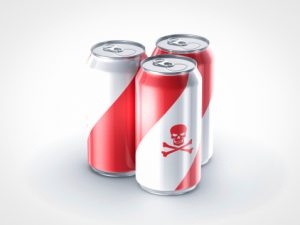
There is no greater marketing than in with the foods we eat. “Fat-free,” “zero-calories,” and “gluten-free” are all buzz words that attract us to particular products, but don’t necessarily mean they are good for our health.
A new study found that another form of marketing aims to make us more health conscious about the food we put in our mouths, with early results proving that it may just work.
Warning labels on food and beverages that warn users of the amount of sugar found in certain products, such as soda and other sweetened drinks, can help lower the prevalence of being overweight or obese, suggests a new Johns Hopkins Bloomberg School of Public Health study.
Computer simulations to test large populations
The study in question used computer modeling to simulate daily activities of shoppers from three major U.S. cities: Baltimore, San Francisco, and Philadelphia. Computer modeling helps to design and test sustainable intervention and policies before rolling them out in real life. Using computer simulations can save considerable time, money, and effort
They found that in places like grocery and corner stores, who sell sugary drinks, warning labels that contained messages noting how added sugar contributes to tooth decay, obesity, and diabetes reduced the overall calorie consumption of citizens. This can attribute to a reduction in both obesity and overweight prevalence.
While the result was considered modest, it was significant enough to lead to such an outcome. Study results show a reduction in obesity prevalence by 1.69 percent and overweight prevalence by 1.39 percent in Baltimore, 4.08 percent and 3.1 percent in San Francisco, and 2.17 percent and 0.36 percent in Philadelphia.
A small step to help reduce the current obesity epidemic
The researchers state that while this is not a solution to the obesity epidemic currently facing America, an intervention such as this still has a positive impact.
“We found that sugary-drink warning labels may help decrease obesity and overweight prevalence across a wide variety of circumstances. A warning label is able to decrease a person’s chance of purchasing a sugary beverage by 4 percent, when nearly half of children cannot read the labels or when many people replace drinking soda with eating more,” says Bruce Y. Lee, MD, MBA, lead author and executive director of the Bloomberg School’s Global Obesity Prevention Center.
Weight gain and obesity is a growing issue in the United States, with current trends pointing to nearly three-quarters of the American population likely being overweight or obese by the year 2020. While much of this has been in response to increased eating habits and a lack of exercise, research suggests that sugary- drink consumption is much to blame.
According to the National Health and Nutrition Examination Survey data from 1988–1994 and 1999–2004, daily calories consumed from sugary beverages increased by 20 percent among 6- to 11-year-olds during those time periods.
“This study also highlights the importance of warning label design. Efforts to increase readability and incorporate memorable visuals may increase warning-label efficacy and ultimately promote an even greater impact,” says Marie C. Ferguson, MSPH, research associate at the GOPC.
Related: Nutritional labels help reduce calorie consumption